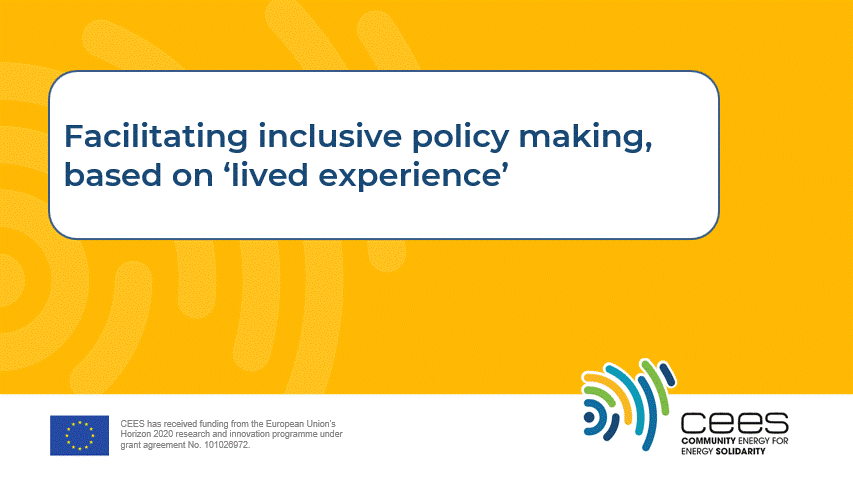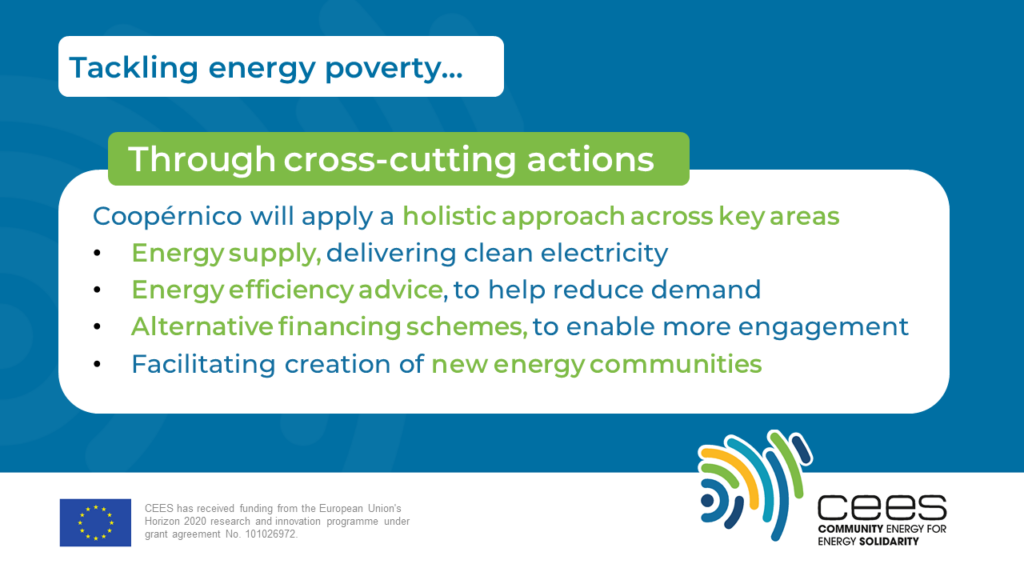When people struggle to keep up with energy bills or live in spaces that are constantly too cold in winter or too hot in summer, they often try to mask the impacts or choose to self-isolate.
In Session 2 (of 5) of the Community Energy for Energy Solidarity webinar day, the focus is on how entities – whether energy communities, civil society organisations, government agencies or even energy companies – wanting to take action can take their first steps.
CEES partners place high value on collaborative approaches, especially in the early stages of ‘Identify’ and ‘Engage’. Often, if one actor is new to the fight against energy poverty, finding and interacting with vulnerable households is uncharted territory. It can then be hugely helpful to identify and engage with other stakeholders that already know vulnerable people for other reasons – and have earned their trust.
Life changes as a way to identify vulnerable households ● ALIenergy
Across Scotland, 25% of households are estimated to be in energy poverty. Narrow the focus to the areas of Argyll, Lomond and the western Islands and the figure skyrockets to 43%, with 33% in extreme energy poverty.
The image of an elderly person, bundled in sweaters, scarf and mittens in a cold, dark stone house is a reality in these regions. But it as Rachel McNicol points out, the signs are often more subtle: a teen reading in the library after school; a pensioner riding the bus; a family living in one room; a mother cooking a full week of meals at one go.
ALIenergy trains its own staff and people from other agencies to watch for ‘life changes’ that might have an impact on someone’s income, daily needs or energy demand. Often, other agencies are well-placed to facilitate an introduction that allows ALIenergy to offer a ‘Cozy Kit’ and open dialogue for more customised and holistic intervention.
ALIenergy stresses that engaging with vulnerable households often means being able to have them speak to ‘the right person at the right time’. As most agencies have stretched resources, pooling expertise and working collaboratively ensures more effective and efficient delivery of services.
Engaging with householders and stakeholders ● Repowering London
Applying a ‘toolkit’ that includes rooftop solar, community support services, education and training, and innovation pilots, Repowering London acts as a bridge between people and the energy sector.
Across years of experience in placing high value ‘the lived experience’, Repowering London has helped its communities recognise themselves as ‘experts’ and ‘knowledge holders, rather than victims. In turn, this amplifies previously hidden and marginalised perspectives and voices that are not reflected in big data sets. Exposing the complexity of daily life bring an emotional charge that can activate communities to become changemakers. In turn, by highlighting the principle of justice, it can be used to challenge power structures.
Recently, Repowering London created opportunity for its community members to speak directly with staff from ofgem, the independent energy regulator in the UK. As Irma Allen highlighted, all parties came away with new knowledge and new motivation.

Going forward, Repowering London aims to use this experience to promote codesign of policy and new supplier services, encourage ‘experts of experience’ to become agents of social change, and bring ‘lived experience’ into governance and decision making.
Engaging energy communities in tackling energy poverty ● Coopérnico
Since 2013, Coopérnico (Portugal) has been attracting investors to community energy projects based on a mission that resonates in two ways. First, by installing rooftop solar, Coopérnico members directly support the clean energy transition at the local level. Second, by delivering lower cost energy to charitable organisations, it frees up more financial resources to direct to service delivery. More recently, Coopérnico has adopted the conviction that energy communities should bring tackling energy poverty directly into the core of their activities. João Lopes described how engagement in CEES will help Coopérnico build experience in this area.

In parallel, Coopérnico is involved in POWERPOOR, a second Horizon 2020-funded project that aims to “empower energy-poor citizens through joint energy initiatives.”
Watch the full webinar on youtube.
Or check out blogs and links to the other sessions:
- Community energy for energy solidarity: A timely approach for a more just future (Session 1)
- Taking action to alleviate energy poverty through hard or soft measures (Session 3)
- Building support for ECs to tackle energy poverty: legal, regulatory and financing aspects (Session 4)
- Evaluating energy poverty projects: key principles and themes (Session 5)